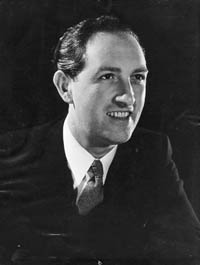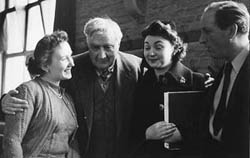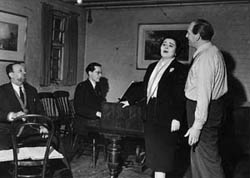|
Edgar Evans
24th February 2007
Edgar Evans dies
Edgar Evans, the Cardiganshire-born opera singer who sang some 45 roles
for the Royal Opera Covent Garden from 1946 to 1975, died in Northwick
Park Hospital, Harrow, on Thursday 22nd February 2007. He was 94.
Evans, who during his time at Covent Garden sang more roles and more
performances at the Opera House than any other artist, was born and
brought up on a farm in Cardiganshire in West Wales before the First
World War.
One day, in the early 1920s, he heard - on one of the early radios - a
broadcast of Enrico Caruso, singing at Covent Garden. The image that
'Covent Garden' conjured up in Edgar's young mind was one of flowers
and palm trees. He thought that it would be nice to spend his life
singing in such a paradise but there seemed to be no way in which it
could ever happen.
Yet a series of chance meetings allied to a great deal of hard work saw
Evans appointed as one of three principal tenors when the Covent Garden
Opera Company was re-formed after the Second World War. Indeed, he was
the last surviving principal singer from that company.
Best remembered for creating the role of Hermann in Tchaikovsky's The
Queen of Spades at the Royal Opera House, Covent Garden, Evans' other
roles included Steva in the first British stage performance of Jenufa,
Zinovy in the British premiere of Katerina Ismailova, the Interpreter
and A Celestial Messenger in the premiere of Vaughan Williams'
Pilgrim's Progress, Andres in the first Covent Garden Wozzeck and
Captain Davidson in Richard Rodney Bennett's Victory.
In addition, he was Dmitri in the company's first Boris Godunov,
Riccardo (Gustavus) in the first Masked Ball performed at Covent Garden
since the War, Aegisthus in the first post-War Elektra, Hellenus in The
Trojans conducted by Kubelik, Narraboth in the Brook-Dali Salome, and
Froh in the first post-War Covent Garden Ring.
His first roles were as the bird god and lover in Purcell's Faerie
Queene in a cast that included Michael Hordern, Constance Shacklock,
Margot Fonteyn and Moira Shearer. He made his 'formal' Covent Garden
debut, deputising for Heddle Nash, as the Chavelier des Grieux in Manon,
under the direction of Reginald Goodall.
He became one of the first British singers to sing in opera abroad
after the War when Erich Kleiber took him to sing in Wagner's Ring in
Rome, with the Rome Opera. Later, he was the tenor soloist in
Beethoven's Choral Symphony when Kleiber conducted the work at Covent
Garden at a concert to help establish an artists' pension fund.
From that first appearance as the Chevalier des Grieux - on 25th March
1947 - to his farewell performance, as the butler in The Visit of the
Old Lady, by von Einem, at Glyndebourne, Edgar Evans was a well
respected member of the music world. His acting and vocal ability
evoked comparison with the very best and elicited reviews such as:
'His voice has a pleasant timbre and is produced with ease. But the
most notable thing about his performance was the fact that it realized
perfectly the elegant as well as the sentimental character of the
melodic line.'
(The Daily Telegraph, April 1947, on his debut as des Grieux in Manon)
'As the cheerful but unfortunate King of Sweden (in Masked Ball), Edgar
Evans follows in the line of some of the greatest tenors who have ever
sung in opera, including Jean de Reske and Caruso.' (Education,
November 27, 1953)
His biography, 'Edgar Evans - Extempore' (ISBN 0-9543113-1-0; £12.50),
was published as recently as December 2005.
End
Further details of the life and achievement of Edgar Evans from: Edgar
Evans - Extempore by Robert Little (ISBN 0-9543113-1-0; £12.50),
available from Bob Little Press & PR or from Amazon. You can find out
more about 'Edgar Evans - Extempore' by following this
link
For copies of pictures please contact: Bob Little Press & PR: 01727
860405; bob.little@dial.pipex.com
|

|


Edgar Evans, principal tenor at Covent Garden from 1946 to 1975

Edgar Evans with Vaughan Williams

Edgar Evans rehearses at Covent Garden with the soprano, Victoria de los Angeles.
|





